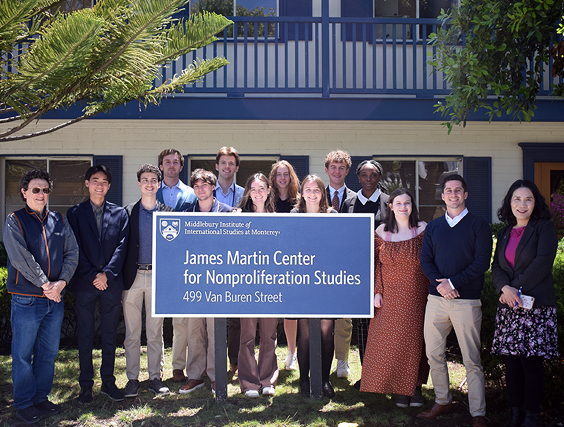June 19, 2023
Masako Toki
The 2023 Summer Undergraduate Nonproliferation Fellowship Program at the James Martin Center for Nonproliferation Studies (CNS) at the Middlebury Institute of International Studies at Monterey (MIIS) started on June 5th. This is the first time the program is fully in-person in Monterey since the pandemic. This summer twelve highly qualified students have been selected as undergraduate fellows through a competitive and rigorous selection process.

Program participants hail from top institutions in the nation, including, Middlebury College, Georgetown University, Indiana University, Princeton University, Trinity Washington University, University of Georgia, and University of Southern California.
The 2023 group is a diverse set of undergraduates from a variety of backgrounds and specializations, with several fellows focusing on the field of International Studies. The fellows have specializations in Near Eastern Studies, Russian and Eastern Europeans Studies, Computer Science, Cultural Anthropology, Political Science, Environmental Studies, and Geography. They all have advanced foreign language skills, including Russian, Spanish, Arabic, Chinese, Portuguese, Italian and German. They are keen to utilize and grow these skills and specializations over the course of this summer.
Lecture Topics and “New Tools”
During this program, fellows receive invaluable job training, work closely with CNS experts, and participate in an engaging lecture series. Lecture topics include the spread and control of weapons of mass destruction (WMD), science of nuclear weapons, and regional nonproliferation issues including Eurasia, East Asia, South Asia, and the Middle East. Lectures also focus on nuclear security, current challenges in nuclear disarmament, export controls, open-source tools for nonproliferation, and more. The summer fellows will also experience hands-on training with using “new tools” for nonproliferation—such as geospatial analysis, and 3D modeling. These lectures are at a graduate level which is very beneficial for these bright undergraduate students.
The fellows also conduct independent research project with guidance from their CNS expert mentors. The fellows have the opportunity to publish this work and share their findings with the broader professional community. Also, the fellows are part of research teams which allows them to collaborate and learn from their peers and experts in the field. All of this work is in line with CNS’ commitment to foster the next generation of nonproliferation global leaders.
About the Program
It has been 26 years since the start of the Summer Undergraduate Fellowship Program in 1997. Since then, many students have gone on to continue to make their mark within the world of nonproliferation. This program runs from early June to late August.
This year’s summer program is funded by the Tom and Sarah Pattison Fund, the Earle Family Fund for International Education, and the Carnegie Corporation of New York.
